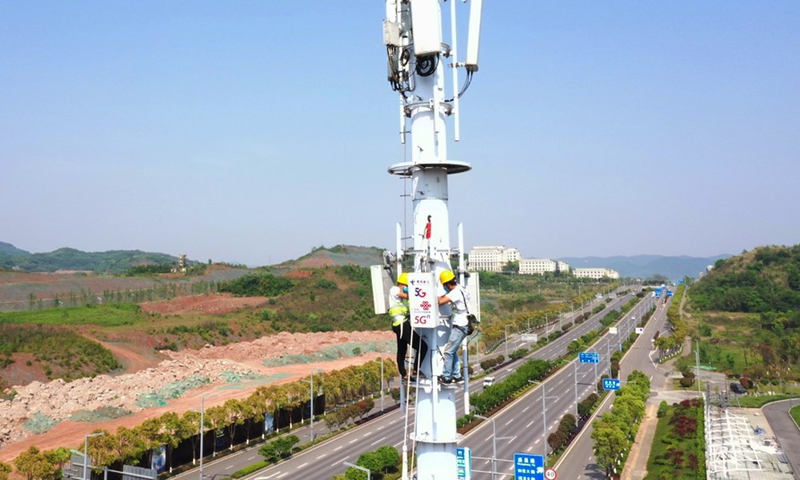COMMENTS / EXPERT ASSESSMENT
How much more can Indian economy withstand New Delhi’s political calculations?

5G Photo:Xinhua
Indian authorities recently announced a six-month 5G test plan, allowing mobile carriers to conduct trials with foreign equipment makers including Ericsson, Nokia and Samsung. Chinese 5G developers such as Huawei and ZTE, though highly competitive across the world, were not named.
Even though India has not officially banned Chinese 5G developers, the move appears more of a political choice, instead of one based on economics. It may cause a short-term loss for Chinese 5G providers; but much more importantly, by politicizing economic activities, India may stifle its fastest and most effective path of adopting the new 5G network, affecting a potentially crucial driver for its economic recovery.
The Embassy of China in India on Wednesday expressed concern and regret over the decision, stressing that it will not only harm relevant Chinese companies' legitimate rights and interests, but also hinder the improvement of the Indian business environment, which is not conducive to the innovation and development of related Indian industries.
With surging populism among its politicians and the deceptive cajolery of the US-led anti-China forces, the South Asian country has attempted to accelerate its economic decoupling from China since last year, seeking to replace or partially take over China's role in the global value chain.
The latest plan further aroused conjecture among observers that Indian politicians, putting their interests first, will keep politicizing economic activities to hinder the normal development of Chinese companies in the market and further elicit headwinds for bilateral economic exchanges.
It is plain for all to see that Chinese 5G developers are leading the development of the industry, providing better products and services at reasonable prices. Only by including more competitive industrial players can a market like India find the most advanced candidate and gain the greatest benefits.
Regrettably, India seems to have a kind of irrational tradition of making bad bargains that only further politicians' interests.
However, New Delhi's campaign of economic decoupling from China has proved futile as China was again India's largest trading partner in 2020. Meanwhile, the US-led clique's cajolery will only misguide India's long-term development.
Tying itself tightly to the West cannot bring tangible rewards for India. In many ways, India is not compatible with Western countries, whether in technology, capital or management. Following the US and playing up groundless security fears to smear Chinese companies may cause it heavier losses.
Meanwhile, the ferocious resurgence of the pandemic in India has removed any optimism over the country's prospects for an economic rebound. Instead, the outlook is now seriously pessimistic. An effective recovery may not come for three to five years.
Under such bleak circumstances, it is crucial for India to reconsider its strategy and change its focus from geopolitical gaming back to economic development, such as in the 5G sector. If New Delhi adopts a fair attitude toward global players and chooses the best candidate without political obstruction, it will speed up the country's deployment of the new network, which can greatly boost growth in many industries.
By contrast, excluding leading 5G providers over political reasons will slow down the country's development and remove its opportunity to take a faster lane to recover from the pandemic. The path of populism or upholding a cold-war mentality will only bring India a gloomy future, and Indian politicians should give serious consideration to this question: How much more can the Indian economy withstand New Delhi's political calculations?
The author is director of the Institute of Bay of Bengal Studies with Shenzhen University. bizopinion@globaltimes.com.cn
